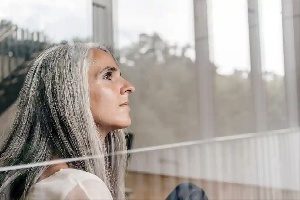- Home - News
- Elections 2024
- News Archive
- Crime & Punishment
- Politics
- Regional
- Editorial
- Health
- Ghanaians Abroad
- Tabloid
- Africa
- Religion
- Photo Archives
- Press Release
Health News of Friday, 4 April 2025
Source: www.ghanawebbers.com
Menopause and Your Skin: What Every Woman Needs to Know
Aging is a privilege. It means you’re alive! However, it can be shocking. One morning, you may notice your skin has changed. You might deal with adult acne, dryness, and thinning hair. Welcome to menopause, where estrogen levels drop.
As a board-certified dermatologist, I see many women with similar concerns. They often ask:
“Why is my skin suddenly so dry?”
“Why am I breaking out in my 50s?”
“Can I keep my skin looking healthy?”
The answer is yes! First, let’s explore what happens to your skin during menopause.
### What Happens to Your Skin During Menopause?
Menopause brings major changes due to declining estrogen levels. Here are some key effects:
**Collagen drops significantly:**
By menopause, you've lost about 1% of collagen yearly since your mid-20s. After menopause, this loss speeds up dramatically. Up to 30% of collagen can disappear in five years. This leads to thinner skin and fine lines.
**Dryness and sensitivity increase:**
Estrogen helps retain moisture and stimulates oil production. When estrogen declines, your skin barrier weakens. This results in dry and irritated skin.
**Hormonal acne appears:**
Acne isn’t just for teenagers anymore! Some women experience breakouts during midlife due to increased male hormones like testosterone.
**Hair thinning occurs:**
Estrogen balances hair growth but declines during menopause. You may notice thinning on your scalp and increased facial hair.
**Hyperpigmentation worsens:**
Without estrogen's protective effects, sun damage becomes more visible. This can lead to precancers or even skin cancers.
### So, What Can You Do?
The good news? There’s a lot you can do for healthy skin during menopause!
#### Hydrate Like It’s Your Job
Use moisturizers with ceramides, hyaluronic acid, and peptides. These help restore your skin barrier. If very dry, layer a hydrating serum under moisturizer. Consider adding a gentle facial oil for extra moisture.
#### Embrace Retinoids (Slowly!)
Retinoids boost collagen and smooth fine lines. Start slowly—two or three times weekly—and layer over moisturizer to reduce irritation.
#### Sunscreen Is Essential
Use SPF 30+ every day—yes, even in winter! Mineral sunscreens are best for sensitive menopausal skin. Sunscreen also prevents hyperpigmentation and collagen breakdown.
#### Combat Acne and Hair Growth
If hormonal acne is an issue, spironolactone may help as a prescription medication. Azelaic acid and niacinamide calm inflammation and reduce breakouts. For unwanted facial hair, consider laser removal or electrolysis.
#### Consider Estrogen Cream
Topical estrogen creams may improve facial elasticity and hydration. Studies show they can increase collagen production too!
#### Support Your Skin From the Inside
Eat more protein for collagen production—think lean meats and fish! Omega-3 fatty acids keep skin plump; include salmon or walnuts in your diet. Check vitamin D levels with your doctor for healthy hair growth!
#### Explore In-Office Treatments
Consider these treatments for added benefits:
- **Microneedling:** Stimulates collagen for firmer skin.
- **Laser resurfacing:** Evens pigmentation.
- **IPL (intense pulsed light):** Targets redness.
- **Sculptra or Radiesse:** Restores natural volume by stimulating collagen.
### Aging Is a Privilege
Menopause isn’t the end—it’s a new chapter! Your body will evolve but that doesn’t mean you have to fight it. Instead, nourish it and protect it! Invest in what makes you feel confident and radiant while seeking support from doctors or friends on this journey.











